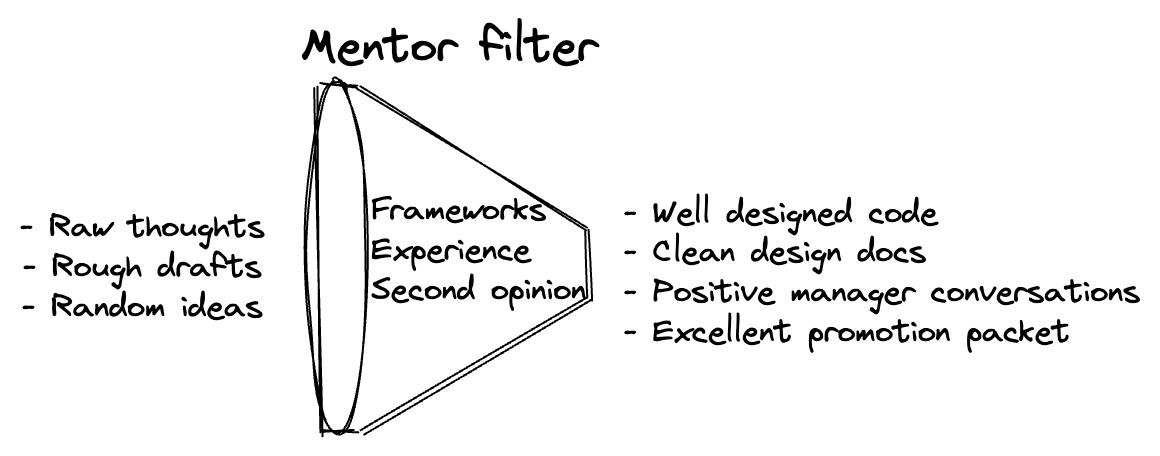The most common software engineering growth advice out there is “Find a mentor.”
So you went to get one. Or you have an informal one. Someone you look up to at work. But how can you make sure you’re getting the most out of your relationship with your mentor?
This article is about receiving the most you can out of those relationships—and giving.
⭐️ Main takeaways
How to learn as much as you can from your mentor
How to give to your mentor so they want to give more back to you
🚨 Disclaimer
While this article is mainly focused on how a mentee can make the relationship as easy as possible for the mentor, that’s not to say the mentor should just sit back and do nothing. The mentor side of the relationship is covered in a separate article.
🤔 Figure out what you don’t know
If you work closely with your mentor, this is by far the highest-leverage activity you can do.
Too often have I gone months without asking my close senior teammates for feedback or advice on areas of improvement. I do my best but sometimes I feel like I already know what they will say or am scared to hear the feedback. Don’t be like me here 😅.
Asking for advice and areas of growth does a few powerful things:
It shows your mentor you are actively looking to grow.
It improves your relationship because people like being asked for advice.
It gives you feedback to run with and improve on that you didn’t know about.
Here are a few ways you can ask your mentor next time:
“What are the things you see that are slowing me down the most?”
“What do you see as the biggest growth opportunities for me?”
“What are the things I should start, stop, and continue doing?”
These are just a few. Pick which one works for you or create your own!
Just don’t be vague and generic. It makes it difficult for your mentor.
For example, the questions above will get you a much better response than, “Do you have any feedback for me?”
From the areas of growth you discuss, you can create a growth plan with your mentor. Here’s a rough outline of what that might look like:
Growth Plan
High-level goals
Achieve senior engineer within 2 cycles
Areas of improvement and actions
More clear and concise technical design documents
Actions
Use technical document template we discussed
For each section, use a visual to describe the architecture
Public speaking skills in presentations and demos
Actions
Speak at a slower pace
Add more visuals in slides
Using this, you can keep track of progress and ensure you and your mentor are on the same page about how to get to the next level.
🤝 Involve them more
A common way we miss out on value from our mentors is by not including them.
I’m guilty of this too. I’ve just gone about my usual day and sometimes forgotten I have someone to lean on.
It’s led to me doing some of these without any advice from my mentor 😬:
The initial draft of a technical design document
Technical design document end result review
Promotion packet / Performance review submission
Code reviews (obviously don’t need to tag on every single one though)
But usually after each of these, I’ve received feedback that could have been caught earlier, from people other than my mentor. It’s not the worst thing, but I would have rather had it corrected earlier through my mentor than have it corrected by everyone else.
Additionally, the more your mentor is involved, the more opportunities they have to help you grow.
In some ways, I view my mentor as a confidante. You can share unpolished drafts, raw thoughts, and get an honest, non-judgmental opinion in return.
Here’s an image describing that, in what I’m calling the “mentor filter.” Your mentor helps you polish and refine your initial thoughts, giving you frameworks and principles to apply to the situation. Over time, you’ll become less reliant and be able to apply the right techniques as you decide.
You shouldn’t abuse this. And as I said, the goal is to become less reliant over time and learn higher-level things each time. But this is the value your mentor can often bring.
🙌 Give your mentor value
The general idea here is you get what you give. The more you give to your mentor, the more they will be inclined to give back and support you.
Give recognition to your mentor
One of the best and easiest ways to give value to your mentor is to give recognition directly to their manager or in public. Tell their manager that every couple of months and ideally just before performance reviews. Also, if they helped on a project but were not directly on the project, make sure they get a shout-out in the launch announcement or in the follow-up thread.
Offer to take on delegated tasks
If you’re interested in the work your mentor is doing, you can let them know you’re open to helping with some of the tasks. This is a win-win because it allows you to work closer with and learn from your mentor and they get more time back from doing some of their tasks.
Show passion
There’s something special about being a mentor who has a mentee who is incredibly passionate about wanting to get better.
Give them a gift (definitely not required)
All of the above add to the principle of reciprocity, and this is no different. This sorta thing is easier when you work in the same office—but one thing you can do is offer to take your mentor to lunch or coffee and pay for both of you. I did this a couple of times during my Twitter internship not thinking about it, and you definitely don’t have to do it. It’s just another option.
Make the relationship as easy and enjoyable for your mentor as possible
An example of this could be keeping track of a 1:1 doc and doing most of the work in there. Summarize the main areas of feedback and advice and follow up on it with your mentor. This makes the relationship less work for your mentor and allows them to focus on giving you as much knowledge as possible.
Follow up on the advice they gave you and tell them.
It’s incredibly rewarding from a mentor’s perspective to hear, “I followed your advice and it worked. Thank you.” The more you can do that with your mentor, the better they will feel. They’ll know what they say gets through and you actually follow up on it.
Doing any number of these will make the relationship much more of a 2-way street, and make the mentor feel like they are receiving just as much as they are giving. It will also make them want to dedicate more time to you.
📖 TL;DR
Identify with your mentor your main areas for growth. Make a growth plan and check in on progress every couple of months.
Involve your mentor in technical design docs, performance reviews, and code reviews. Give them them more opportunities to help you grow.
Don’t forget to give your mentor value in return! Give thanks often and show passion when they take time to teach you and toward your own growth.
And with that, I leave you with one final Yoda meme.
I hope you enjoyed!
As always, thank you for reading.
- Jordan
P.S. You can reply to this email; it will get to me, and I will read it even if I can’t always reply in a timely manner.
Did you find this issue valuable? If so, there are two ways you can help:
You can also hit the like ❤️ button at the bottom of this email to help support me. It really helps!
As always, thank you for reading.
- Jordan
P.S. You can reply to this email; it will get to me, and I will read it even if I can’t always reply in a timely manner.






Valuable lesson, I am going to ask my mentor for monthly feedbacks.